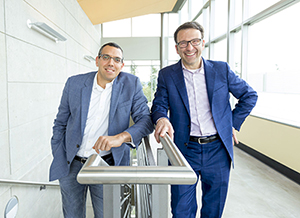While much transportation trade press attention has been given to the predicted purchase of Hamburg Sud by Maersk, the Danish mega carrier has been quietly negotiating a deal with another legendary giant in the information technology sector.
Global transport and logistics powerhouse Maersk recently announced that it has joined forces with Microsoft Corp. in a strategic move to revolutionize supply-chain management and worldwide commerce. From its connected vessels to its transportation economics, the company is betting on Microsoft to fuel growth and power logistics globally.
Cathy Morrow Roberson, president of the research firm Logistics Trends and Insights LLC, calls this “A big win” for Microsoft.
“Maersk is already familiar with the software company's abilities, as its energy group already utilizes Microsoft for its services,” she said. “This new relationship will allow Maersk to build out it’s digital platform that in turn, will have the potential to transform the logistics industry.”
In essence, this agreement means that Microsoft has been selected as the preferred cloud partner for Maersk's digital “transformation journey,” supporting its high-value assets such as carrier performance, equipment utilization and supplier performance.
Microsoft Azure is the digital platform of record to power Maersk's app store and help fuel business model innovations.
In total, Maersk estimates that the power of data will help save tens of millions of dollars to the bottom line annually.
“Our aim is to simplify and enhance visibility in supply chains by providing a seamless end-to-end digital experience for our customers,” said Ibrahim Gokcen, chief digital officer, Maersk. “Microsoft Azure is the cornerstone in our digital strategy, providing one common platform shared by all our transport and logistics businesses. On Azure, we are also creating a marketplace of apps and digital products that improve operations and drive better business decisions.”
Maersk is the largest transport and logistics company in the world with offices in 130 countries and a fleet of more than 1,000 vessels. The company's container carrier, Maersk Line, sails in all major trade lanes, transporting more than 17 million containers annually, and its terminal operating unit, APM Terminals, is operating in more than 70 ports worldwide. Delays in manufacturing, bad weather, terminal bottlenecks and other incidents routinely cause disruptions to global supply chains. The ability to anticipate, make timely decisions and take swift action is critical when millions of dollars are on the line and unforeseen events impact shipments and business productivity.
Damco, Maersk's business unit for supply-chain solutions, recently launched several digital supply-chain solutions built on Microsoft Azure.
SC
MR


Latest Supply Chain News
- Services sector sees growth in October, reports ISM
- Balanced supply chain management Part 4: The key—leading beyond the silo
- Managing inbound freight: What has changed in two decades?
- Inbound freight: Often a missed opportunity
- Aggregators sitting on the throne of Africa’s e-commerce supply chains: What lessons can we learn?
- More News
Latest Resources

 Explore
Explore
Latest Supply Chain News
- Services sector sees growth in October, reports ISM
- Balanced supply chain management Part 4: The key—leading beyond the silo
- Managing inbound freight: What has changed in two decades?
- Inbound freight: Often a missed opportunity
- Aggregators sitting on the throne of Africa’s e-commerce supply chains: What lessons can we learn?
- Cross-border transport 2024: Navigating the surge
- More latest news
Latest Resources

Subscribe

Supply Chain Management Review delivers the best industry content.

Editors’ Picks





